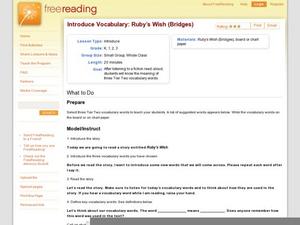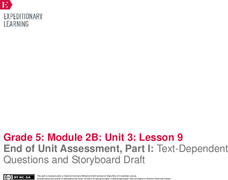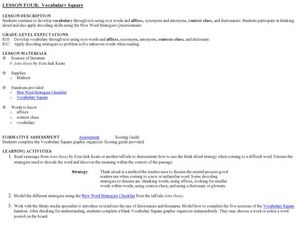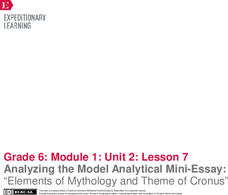Curated OER
Introduce Vocabulary: Ruby the Copycat (Rathmann)
Have your scholars ever known someone who was a copycat? Approach this issue as you study vocabulary in context by reading Peggy Rathmann's book Ruby the Copycat. Proposed focus words are: recite, murmur,...
Curated OER
Introduce Vocabulary: Ruby's Wish (Bridges)
Jump into traditional Chinese culture with budding readers as they examine vocabulary in context through Shirin Yim Bridge's book Ruby's Wish. This book is read on YouTube if you don't have it on hand. Scholars are briefly...
Curated OER
Introduce Vocabulary: Smoky Night (Bunting)
Experience the Los Angeles Riots through the eyes of a child in Even Bunting's poignant story Smoky Night. Use this text as you teach vocabulary in context, using comprehension questions to help scholars make connections to outside...
Curated OER
Introduce Vocabulary: Some Birthday! (Polacco)
Patricia Polacco weaves an engaging tale for budding readers in her book Some Birthday!, an excellent resource for vocabulary in context. You can use this text to introduce the following words: investigate, snarl, and squawk....
Curated OER
Introduce Vocabulary: Alphabears: An ABC Book (Hague)
Learn new words in the context of Kathleen Hague's whimsical alphabet book, Alphabears: An ABC Book (note: you can use these strategies for any text). Get pupils ready by introducing the new words they will...
Curated OER
Introduce Vocabulary: Franklin Goes to the Hospital (Bourgeois)
Franklin the turtle is on another adventure in Paulette Bourgeois' book Franklin Goes to the Hospital, and there are plenty of new words for your young readers to explore as they hear this story. Although you can include more,...
Curated OER
Introduce Vocabulary: In the Small, Small Pond (Fleming)
Explore pond life and action words through Denise Fleming's In the Small, Small Pond, which you can find online if you don't have it on hand. Learners explore the following verbs: doze, hover, plunge, scatter,...
Curated OER
Introduce Vocabulary: Tar Beach (Ringgold)
Anyplace can become a beach! Budding readers explore Faith Ringgold's world of imagination in her book Tar Beach, which can be found on YouTube if you don't have it. What words will budding readers learn? They focus on the following...
EngageNY
Organizing Evidence from Multiple Informational Texts to Prepare for Writing: What Makes an Earthquake a Natural Disaster?
Fifth graders prepare for their end of the unit essay assessment by continuing to look at what makes an earthquake a natural disaster. They complete a graphic organizer and write a topic sentence. To finish, they view a model essay and...
Teaching Oasis
Gingerbread Baby Lesson Plan Guide
Reinforce reading comprehension and story mapping skills with the help from a story, Gingerbread Baby by Jen Brett. Individuals discover new vocabulary, make predictions, retell main events, respond to reading using a graphic...
EngageNY
Relationships Between Key Scientific Concepts: Planning What Causes Earthquakes
That is ground shaking news! Scholars read Earthquake in multiple reads to determine the gist, identify cause and effect relationships, and understand vocabulary. Learners complete graphic organizers to describe what happens before and...
EngageNY
Building Background Knowledge About the Hero’s Journey, Part 2: Acts 2 and 3 Plus Focusing on Key Vocabulary in “The Hero’s Journey”
It's all in the details. Scholars read acts two and three of The Hero's Journey and collect important details from the text. They share their notes with their peers and listen for key words from the story. They then turn their attention...
Curated OER
The Lion, the Witch, and the Wardrobe: Graphic Organizer: Venn Diagram
Get to know more about the characters of the novel The Lion, the Witch and the Wardrobe by C.S. Lewis by comparing and contrasting their character traits using a Venn diagram.
Curated OER
Vocabulary Development
By utilizing a graphic organizer called a bubble map, young readers work toward developing their vocabulary. After reading a story, a word that has something to do with the story is put in the middle circle. Then, other words that have...
Curated OER
Study Guide for Missing May
Use this comprehensive packet to accompany a study of Missing May by Cynthia Rylant. Starting out with a brief author biography and background information about the novel, this guide includes materials to use throughout the entire novel....
EngageNY
End of Unit Assessment, Part 1: Text-Dependent Questions and Storyboard Draft: “You Can Do a Graphic Novel” Excerpt
Eyes on the finish line. Serving as the first part of the end of unit assessment, learners answer questions based on a text about how to write a graphic novel. Using what they've learned, they then create a storyboard about the invention...
Curated OER
Vocabulary Square
Examine the use of vocabulary squares to aid in reading comprehension. Assessment and graphic organizer included.
Curated OER
Identifying Story Elements
Help your class identify story elements. They will discuss character, setting, problem, and solution after reading a story. A graphic organizer will help them to identify various elements with guided practice and independent practice...
EngageNY
Analyzing the Model Analytical Mini-Essay: “Elements of Mythology and Theme of Cronus”
It's time to make a claim. Scholars learn what it means to make a claim by first looking at a model analytical mini-essay to determine how the author relayed ideas. Pupils then work with partners to discuss how the author might have...
EngageNY
Grade 9 ELA Module 1, Unit 1, Lesson 6
Can you tell everything about a character based on their actions? Delve into the prominent characters of Karen Russell's "St. Lucy's Home for Girls Raised by Wolves" with helpful reading tips and discussion questions. A thorough lesson...
Scholastic
Citing Text Evidence
Could you go without your cell phone for 48 hours? Pose this question to your class and then read the article provided here. Pupils mark the text and and complete a graphic organizer that requires the use of textual evidence.
EngageNY
Establishing Structures for Reading: Gathering Evidence about Salva’s and Nya’s Points of View (Reread Chapters 1 and 2)
Readers practice gathering textual evidence to support their understanding of character point of view in A Long Walk to Water by Linda Sue Park. Working with partners, they complete a Gathering Evidence graphic organizer and engage in...
EngageNY
Carl Hiaasen’s Perspective of Florida: Part 2
Look it up. Scholars read Florida: A Paradise of Scandals Excerpt 1 and use a dictionary to look up any unfamiliar words. They then do a close read of the text and answer text-dependent questions. Learners analyze author perspective by...
LABScI
Taxonomy: Who is in My family?
Find similarities in seemingly unlike organisms. The second instructional activity in a series of 12 builds the concept of a taxonomy and explores the use of a dichotomous key. Learners begin in part one by attempting to group a set of...























